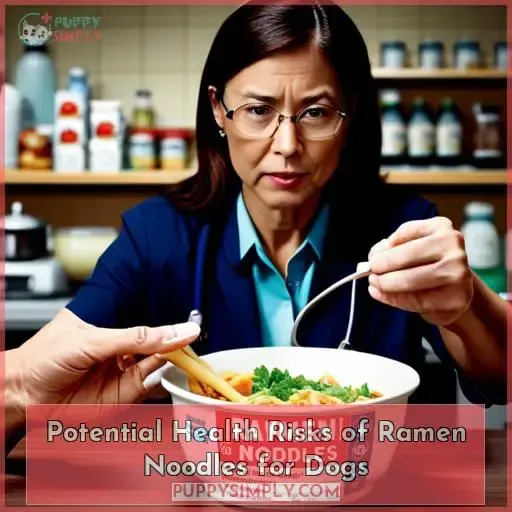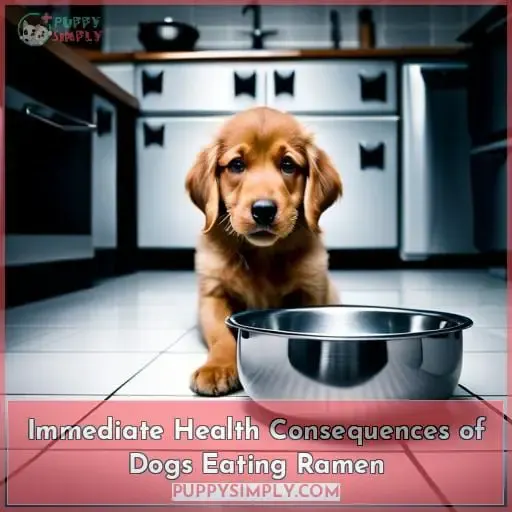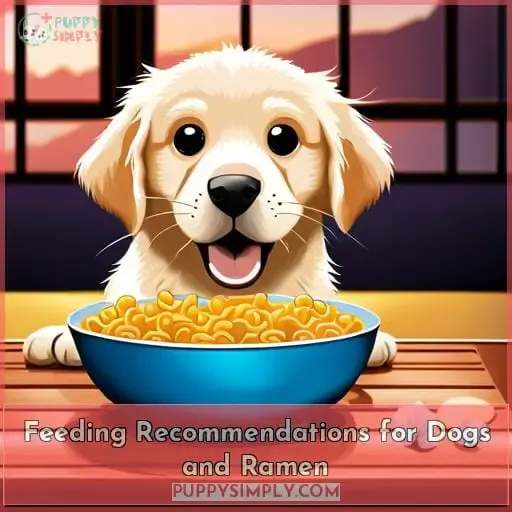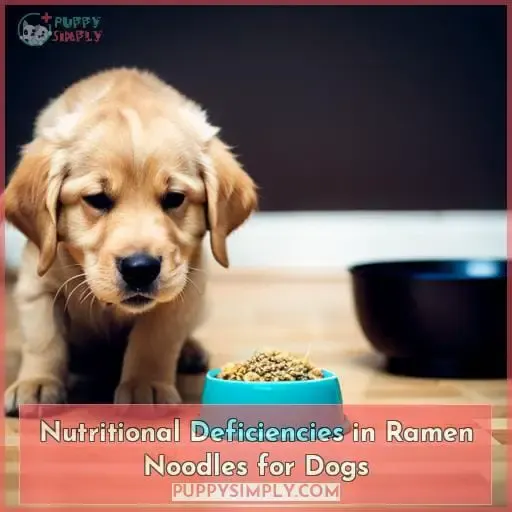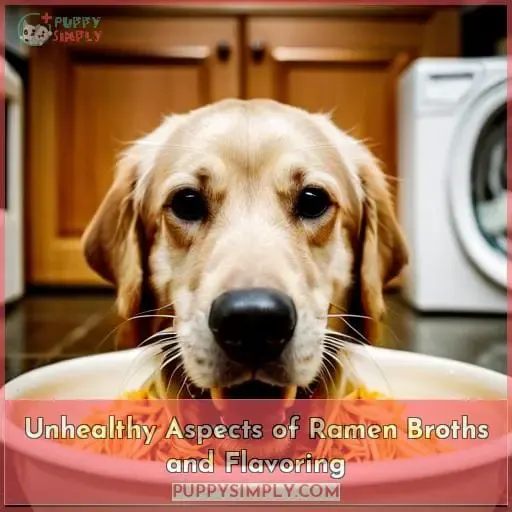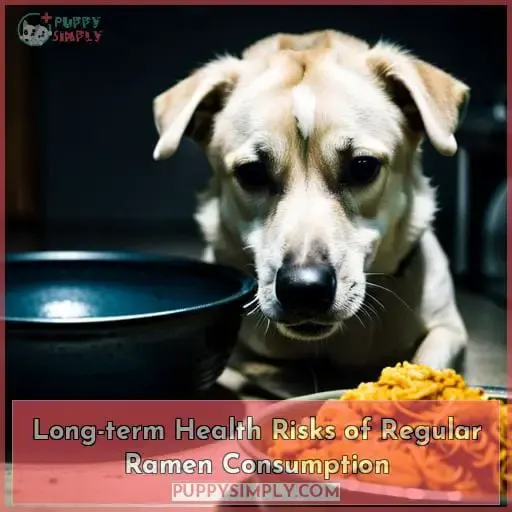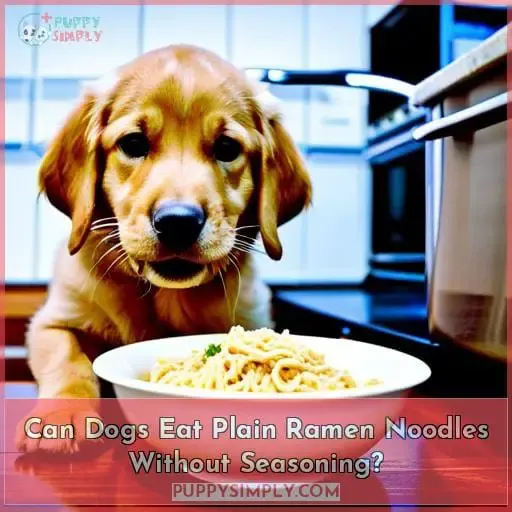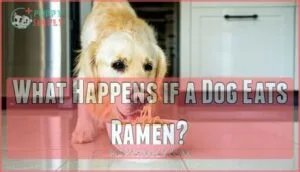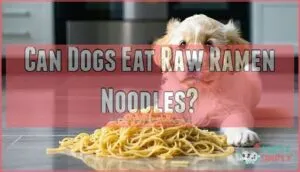This site is supported by our readers. We may earn a commission, at no cost to you, if you purchase through links.
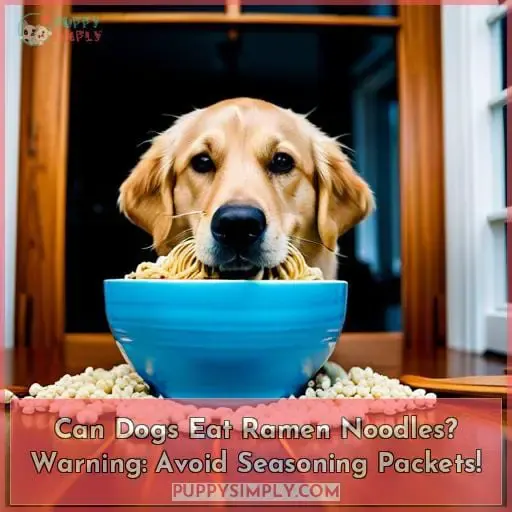 It’s often tempting to share a comforting bowl of ramen noodles with your beloved pup. But before you do, it’s important to understand the potential risks associated with letting them eat this popular snack.
It’s often tempting to share a comforting bowl of ramen noodles with your beloved pup. But before you do, it’s important to understand the potential risks associated with letting them eat this popular snack.
Can dogs eat ramen noodles without seasoning? While it may not be immediately toxic when ingested, there are many health-related concerns that should make pet owners think twice before dishing out any noodle dishes.
In this article, we’ll explore why dogs shouldn’t consume instant or authentic ramen and what steps can be taken if they accidentally ingest some flavoring packets or raw noodles.
Table Of Contents
- Key Takeaways
- Potential Health Risks of Ramen Noodles for Dogs
- Immediate Health Consequences of Dogs Eating Ramen
- Feeding Recommendations for Dogs and Ramen
- Nutritional Deficiencies in Ramen Noodles for Dogs
- Unhealthy Aspects of Ramen Broths and Flavoring
- Long-term Health Risks of Regular Ramen Consumption
- Can Dogs Eat Plain Ramen Noodles Without Seasoning?
- What Happens if a Dog Eats Ramen?
- Can Dogs Eat Raw Ramen Noodles?
- Frequently Asked Questions (FAQs)
- Conclusion
Key Takeaways
- Ramen noodles without seasoning can still be harmful to dogs due to their high sodium levels.
- Spices and herbs in ramen noodles can disrupt canine digestion.
- Dogs have difficulty digesting raw noodles and may experience digestive issues.
- Ramen noodles lack important nutrients such as protein, potassium, and fiber.
Potential Health Risks of Ramen Noodles for Dogs
You may have heard that ramen noodles are not a safe option for your canine companion. It’s true; the high sodium content, toxic ingredients like garlic, onions, and MSG, as well as preservatives, can all increase the risk of cancer in dogs.
Not to mention that spices and herbs used for flavoring can cause digestive issues, while allergens such as gluten, dairy, or soy could lead to allergic reactions affecting both the skin and digestion.
Therefore, it is important to understand these potential health risks before feeding any type of ramen noodle product to your dog.
Excessive Sodium
You should be aware that because of its high sodium content, consuming ramen noodles regularly can put your pet at risk for:
- Dehydration
- Seizures
- Kidney failure
- Digestive issues due to gluten allergy or raw noodles in seasoning packets and preservatives added to the mix!
Toxic Ingredients (Garlic, Onions, MSG)
Be aware that many ramen flavorings contain toxic ingredients like garlic, onions, and MSG, which can be very harmful to your pet. Dog allergies and sodium toxicity are common when consuming plain noodles or seasoning packets.
Raw noodles can cause choking hazards, while raw ramen may damage the digestive system of dogs.
Instant ramen broth is also high in sodium content, as it contains MSG, garlic, onions, and oils, which disrupt canine digestion if consumed regularly. To safely feed your dog plain ramen occasionally, follow these rules: watch for signs of poisoning, never give seasoning packets, only feed small amounts in moderation, and check all ingredients even without the seasoning packet.
Preservatives and Cancer Risk
Preservatives added to ramen noodles can increase the risk of cancer in your pet. Ingestion symptoms may include dehydration, seizures from sodium toxicity, and food allergies such as gluten intolerance.
Chicken ramen noodles are generally less toxic than other flavors due to lower preservative content in their broth compared with flavor packets containing MSG, garlic, or onions.
Allergies can occur when consuming any type of ramen noodle and should be monitored for signs like vomiting or diarrhea if ingestion occurs.
Digestive Issues From Spices and Herbs
Spices and herbs like thyme, chili powder, garlic, and onions can cause digestive issues in your pup if consumed regularly. Eating habits of puppies are different from adult dogs; their dietary needs change as they grow, so watch out for health concerns when it comes to nutrition facts.
Food allergies may also arise from refined carbs found in ramen noodles that could lead to kidney failure or gastrointestinal irritation.
Allergens (Gluten, Dairy, Soy)
You could be exposing your furry friend to potential allergens like gluten, dairy, and soy when feeding them ramen noodles. Allergies can range from an intolerance for wheat to a sensitivity towards dairy or even a reaction from consuming soy.
It’s important that you test for any allergenic reactions before giving your pup spicy ramen every day.
- Test for allergen sensitivities before introducing new foods.
- Look out for signs of wheat allergy such as vomiting and diarrhea.
- Dairy sensitivity may cause skin irritations or infections.
- Soy intolerance often involves gas and bloating after consumption.
- Gluten reactions can lead to serious health issues if not treated properly.
Immediate Health Consequences of Dogs Eating Ramen
Discovering the immediate health consequences of dogs eating ramen can be a worrying experience. Gastrointestinal irritation and diarrhea, sodium toxicity and dehydration, kidney failure from toxic ingredients, allergic reactions affecting the skin and digestive system, as well as a choking hazard from raw noodles, are all potential risks associated with this foodstuff.
It is important to watch for signs of poisoning like vomiting or lethargy if your dog has ingested any form of ramen noodle product in order to protect their long-term health.
Gastrointestinal Irritation and Diarrhea
Consuming ramen noodles without seasoning can lead to gastrointestinal irritation and diarrhea in your pet. High levels of sodium, depleted minerals, and a lack of digestive enzymes can all contribute to these issues.
Additionally, choking risks are increased due to the raw nature of the noodles, as well as wheat allergy symptoms such as vomiting or infections being triggered by flour content. Therefore, it is important for pet owners to ensure that their furry friends do not consume any form of instant ramen regularly.
Sodium Toxicity and Dehydration
Excessive consumption of ramen noodles can lead to sodium toxicity and dehydration, leaving your pup feeling sluggish and listless. Sodium levels in our canine companions are highly regulated by their bodies; if too much is ingested, it can cause a variety of serious issues.
Dietary needs for dogs vary greatly depending on breed, age, size, and activity level. Symptoms of dehydration include excessive panting and lethargy. Nutritional deficiencies can arise due to a lack of essential vitamins and minerals.
It’s important to understand the risks associated with feeding your dog this type of food before allowing them access – even without seasoning packets!
Kidney Failure From Toxic Ingredients
Incorrect ingredients in ramen, such as garlic and onions, can lead to kidney failure if consumed by your pup. Excessive sodium or exposure to toxic additives can raise levels in the blood that damage vital organs.
Raw noodles may contain harmful bacteria that further complicate matters. To prevent this situation from occurring, always check for unhealthy ingredients and never allow access to raw ramen noodles without supervision.
Allergic Reactions Affecting Skin and Digestive System
Eating ramen noodles without seasoning can lead to allergic reactions that affect both your skin and digestive system. Allergens like gluten, dairy, and soy in the ingredients or added during cooking can be sources of irritation.
Choking Hazard From Raw Noodles
Consuming raw noodles can be a choking hazard for your pet, so it’s important to take precautionary measures. Raw chicken and seasonings could cause harm if ingested regularly, with high sodium levels contributing to dehydration and seizures.
Allergen risks, including wheat/flour allergies, should also be taken into consideration before feeding ramen to your pup.
Feeding Recommendations for Dogs and Ramen
Greetings! It is important to be aware of the potential risks associated with feeding ramen noodles to dogs. To keep your pup safe, it is recommended that you avoid seasoning packets and check ingredients, even without seasoning, when considering plain noodles in small amounts occasionally.
Additionally, watch for signs of poisoning such as vomiting, diarrhea, or lethargy and take measures to prevent accidental ingestion.
Avoid Seasoning Packets
Never give your pup seasoning packets with ramen. High sodium levels can cause toxicity, leading to seizures and kidney failure.
Check Ingredients Even Without Seasoning
Even when opting for plain noodles, always check the ingredients list to ensure that any unexpected additives won’t cause harm. Avoid seasoning packets at all costs and consider making homemade broth without onions or garlic instead.
Feeding a dog ramen should only be done occasionally in small amounts as part of a balanced diet.
Plain Noodles in Small Amounts Occasionally
You can give your pup plain ramen noodles every now and then, as long as the serving size is small. Limit intake to occasional treats for a balanced diet instead of regular meals. Make homemade broth without garlic or onion flavoring for flavorless noodles that are easier to digest.
Signs of Poisoning to Watch For
Keep a watchful eye for signs of poisoning if your pup has had ramen, such as vomiting, lethargy, or diarrhea. Excessive consumption can lead to an obesity risk and dehydration from excessive sodium intake.
Choking hazards may arise due to raw noodles; food allergies could also be triggered by gluten, dairy, and soy in the noodle itself. Nutritional deficiencies are common too due to a lack of protein and other key vitamins necessary for good health.
Prevention of Accidental Ingestion
Be vigilant to prevent your pup from accidentally ingesting ramen noodles – the risks are too serious for them. Avoid access by keeping packets and noodles out of reach, only feed small amounts occasionally with plain noodles, make homemade broth without onions/garlic or flavor powders, and always check ingredients.
Store safely in sealed containers; look closely at labels before serving to ensure safe consumption every time.
Nutritional Deficiencies in Ramen Noodles for Dogs
Ramen noodles may not be the best choice for your dog due to their low protein, potassium, fiber, magnesium, and Vitamin B12 content. Additionally, dogs have difficulty digesting these noodles, which can lead to damage in the digestive system, even if they are eaten raw.
Therefore, it is important that you consider alternatives when deciding what food is suitable for your pet’s dietary needs.
Low Protein, Potassium, Fiber, Magnesium, Vitamin B12
Ramen noodles contain alarmingly low amounts of essential nutrients like protein, potassium, fiber, magnesium, and vitamin B12 – ironic considering such a small snack packs quite a punch. This can lead to nutritional imbalances in dogs since their diet should be high in these important vitamins and minerals.
Too much sodium intake is also dangerous as it increases the risk of dehydration and can cause seizures or even kidney failure if ingested too often. Digestive issues are another concern due to spices found in flavorings, while allergen risks exist from common ingredients like gluten or dairy products present in ramen noodles.
It’s clear that this food isn’t suitable for regular consumption by dogs – not only does it lack key nutrients, but its high salt content poses serious health risks too!
Difficulty Digesting Noodles
Dogs may struggle to digest the raw noodles in ramen, as they lack an enzyme necessary for breaking them down. High sodium levels also make it difficult for dogs to process the food. Furthermore, most brands of ramen are low in protein and other essential nutrients that they need daily.
Wheat allergies can cause problems too due to potential allergen exposure from flour-based ingredients.
Damage to Digestive System From Raw Noodles
If consumed raw, the noodles can cause severe damage to your pup’s digestive system. Bedtime snacking, poor nutrition from grain allergies, or meatless diets can all lead to GI distress if ramen is part of their diet.
Raw noodles are difficult for dogs’ bodies to break down due to a lack of appropriate enzymes and may damage the stomach lining, leading to further digestion issues. Ramen should never replace a balanced meal as it lacks essential nutrients needed for good health.
Avoid feeding your pet this bedtime snack at all costs!
Unhealthy Aspects of Ramen Broths and Flavoring
Navigating the potential health risks associated with ramen noodles and their components is important for pet owners. High sodium content in instant ramen broth, toxic ingredients like MSG, garlic, or onions often found in flavor packets, and disruptive effects of oils on digestion are all unhealthy aspects to consider when deciding if dogs should eat this food.
It’s wise to understand how these elements can affect your pup before making a decision about adding them to their diet.
High Sodium Content in Instant Ramen Broth
Instant ramen broth typically contains a high amount of sodium, which can be hazardous to your pup’s health. Consuming large amounts or regular intake can lead to seizures due to sodium toxicity and digestive issues from flavor packets containing MSG, garlic, and onions.
Wheat allergies may also cause diarrhea and vomiting in some dogs if present in the noodles. To avoid these risks, it’s best to make homemade broth without any added seasonings. Additionally, check for wheat/flour content on the package label before giving it to your pup.
Feeding plain chicken ramen occasionally is safer than high-sodium options with too many spices that could harm their digestion or nutrition levels. These options may lack fiber, magnesium, and vitamin B12, which are needed for growth and development.
Toxic Ingredients in Flavor Packets
You should avoid flavor packets in ramen noodles, as they typically contain toxic ingredients such as MSG, garlic, and onions, which can be hazardous to your pet’s health. It is estimated that sodium levels in instant ramen broth are up to 5 times higher than the daily recommended amount for dogs.
Look for additive-free and flavor-free alternatives when feeding your pup or opt for safe homemade broths with lower sodium levels instead. Eating too much ramen could lead to serious allergy risks like vomiting, diarrhea, or skin infections, so it’s important to keep an eye on any changes you may see after eating them.
To ensure healthy meals without risking harm, make sure you read labels carefully before giving anything new and provide other nutrient-rich foods alongside plain noodles occasionally – but always limit consumption!
Disruptive Effects of Oils on Digestion
Oils in ramen flavorings can cause digestive issues for your pup, making it hard to break down the noodles. High oil content mixed with sodium can lead to upset stomachs and wheat allergies.
The flavor packets usually contain MSG, garlic, or onions, which are all toxic ingredients that should be avoided. These unhealthy additives also contribute to an excessive sodium intake, causing further disruption of digestion.
Being aware of these risks allows you to take precautions, such as avoiding pre-made seasoning packages and keeping a balanced diet filled with nutrient-dense food items like fruits and vegetables away from your pet’s reach!
Long-term Health Risks of Regular Ramen Consumption
As it relates to the long-term health risks of regular ramen consumption, there are a few key points to consider. Heart disease and weight gain can be potential outcomes from too much instant noodle intake, as well as pancreatitis in more severe cases.
Additionally, wheat or flour allergies could lead to symptoms such as diarrhea, vomiting, and possible infections if not avoided. It is important for one’s health that they understand these associated risks before making any decisions about their diet involving ramen noodles without seasoning.
Heart Disease and Weight Gain
Regularly consuming ramen noodles can lead to long-term health issues like heart disease and weight gain, similar to how a balloon slowly expands with more air until it pops. High sodium levels in instant ramen broth can cause kidney failure or dehydration, while spices, garlic, and onions may cause digestive issues or allergic reactions.
Additionally, the lack of essential nutrients such as protein, potassium, fiber, magnesium, and vitamin B12 contribute to unhealthy weight gain when consumed regularly.
Pancreatitis
Consuming too much ramen regularly can lead to pancreatitis, an inflammation of the pancreas which causes abdominal pain and difficulty digesting food.
- Pancreatitis symptoms include nausea, vomiting, and fever.
- Dietary changes must be made for proper treatment.
- Risk factors, such as alcohol consumption, may increase the chances of developing pancreatitis.
- Treatment options range from medication to surgery depending on severity and duration.
- Diet considerations could include removing gluten or dairy products.
Proper medical guidance is recommended if symptoms persist so that appropriate measures can be taken for a successful recovery.
Wheat/Flour Allergy Risks
Consuming ramen noodles, even without seasoning, can cause issues for those with a wheat or flour allergy. Anaphylaxis is possible in severe cases and can be life-threatening. Allergen testing should determine if there are potential sensitivity reactions.
Sodium toxicity should also be monitored to prevent kidney failure. Digestive problems may arise due to the lack of nutrients, as well as wheat intolerance causing diarrhea, vomiting, and infections.
With all these risks involved, it’s best to not feed dogs ramen regularly. However, if occasional small amounts are given, one must monitor closely for any signs of poisoning like lethargy or GI irritation due to spices/herbs found in flavor packets.
Can Dogs Eat Plain Ramen Noodles Without Seasoning?
You should feed your pup plain ramen noodles only occasionally and in small amounts, as they lack key nutrients needed for a balanced diet. It’s important to avoid feeding them any kind of seasoning packet, due to the high sodium levels and potential toxins like garlic or MSG.
The best way to ensure that your dog is safe when eating these types of noodles is by making sure you prepare it in homemade broth without onions or garlic added. Make sure all ingredients are checked before giving it, as even with no flavoring included, there may be allergens such as gluten, dairy, or soy present which can cause serious reactions if consumed by dogs.
It’s also wise to look out for signs of poisoning after consumption, such as vomiting, diarrhea, and lethargy, which could indicate an adverse reaction from something within the meal has occurred.
With this being said, however, raw ramen noodles can still damage their digestive system because dogs lack the enzyme necessary for breaking down carbohydrates found within them.
What Happens if a Dog Eats Ramen?
Greeting aside, it is important to understand the potential risks associated with a dog eating ramen. These include gastrointestinal irritation and an upset stomach, hypernatremia (sodium toxicity), kidney failure, and allergic reactions.
To avoid these health effects on your pet, it is essential that you take necessary precautions when feeding them ramen noodles without seasoning.
Gastrointestinal Irritation and Upset Stomach
Eating plain ramen noodles without seasoning can cause your pup’s stomach to become irritated. The sodium levels are too high for dogs, causing a risk of dehydration and digestive issues. Allergic reactions, such as wheat allergy, may also occur, leading to vomiting and diarrhea.
Another issue that pet owners should be aware of when feeding their furry friends this dish is the choking hazard from raw noodles.
Hypernatremia (Sodium Toxicity)
Excessive consumption of ramen noodles can lead to sodium toxicity, or hypernatremia, which causes dehydration and seizures in dogs. The dangerous ingredients found in seasoning packets are a major culprit for this condition: high levels of sodium, MSG, garlic, and onion.
Additionally, raw noodles add to the risk as they contain even higher amounts of these substances. It is essential for pet owners to be aware that the consequences of consuming too much ramen can be serious since it affects canine sodium levels dramatically, leading to potentially fatal results if left untreated.
Kidney Failure
Regularly indulging in ramen noodles without seasoning can put your pup at risk of kidney failure. Eating too much sodium from the noodle broth or flavor packets disrupts their delicate balance, leading to damage over time.
To avoid this, mix up their diet with variety and plan meals tailored to their allergies so they get essential nutrients instead.
Kidney health is key for long-term wellness, so watch out for any signs like vomiting or diarrhea that could indicate a problem!
| Risk Factor | Effects | Solutions |
|---|---|---|
| Sodium Balance | Damage over time | Diet Variety & Planning |
| Food Allergies | Poor Nutrient Intake | Tailor meals according to allergies |
Regularly indulging in ramen noodles without seasoning can put your pup at risk of kidney failure as it disrupts the delicate sodium balance within them, leading to damage over time. Not only does this mean poor nutrient intake due to food allergies, but it also means missing out on essential minerals and vitamins needed for good health, such as potassium, fiber, magnesium, and vitamin B12, which are all low in Ramen Noodles.
To keep our furry friends healthy, it’s important we tailor meals accordingly by mixing up diets with variety while planning around known sensitivities/allergies.
Allergic Reactions
If you’re not careful, your pup could suffer from allergic reactions like skin rashes or digestive upset if they ingest ramen. Immune reactions can occur due to food allergies, high sodium levels, and ingredients that their dietary needs cannot process.
Dogs lack the enzyme needed for digestion of noodles, which leads to further GI issues. In addition, there is a potential toxin exposure from flavoring packets and preservatives.
Monitor closely when feeding, as even plain noodles can cause problems with their sensitive systems.
Can Dogs Eat Raw Ramen Noodles?
Raw ramen noodles can be dangerous for your furry friend, so it’s important to make sure they don’t have access. Ingesting raw ramen noodles carries the risk of harmful effects that could affect your pet’s health and wellbeing.
These include sodium toxicity, allergic reactions, digestive issues, and dietary changes due to the lack of key nutrients in this food item. The high salt levels found in instant noodle broth are especially concerning, as too much sodium can lead to dehydration or even seizures if ingested by dogs in large enough quantities.
Further risks arise from flavorings like onions and garlic, which are highly toxic for pets. Spices like thyme can cause stomach problems such as diarrhea or indigestion when consumed regularly over time.
Allergic reactions may also occur because some varieties contain allergens such as gluten, dairy, or soy products. These allergens may trigger adverse responses if eaten by sensitive animals, including skin rashes or vomiting/diarrhea spells due to a weakened immune system caused by poor diet choices overall, rather than just one type of food specifically being responsible.
To avoid these potential risks completely, it’s best not to give any kind of ramen noodle product that contains seasoning packets at all. Only plain boiled versions should be considered on rare occasions, provided they are part of an otherwise balanced diet plan tailored towards your dog’s individual needs given their age, breed, etc.
Frequently Asked Questions (FAQs)
What Are the Allergens in Ramen Noodles?
Ramen noodles may contain allergens such as gluten, dairy, and soy. To avoid an allergic reaction, always check the ingredients before consuming. If feeding to a dog, be sure not to include any seasoning packets, which could be extremely unhealthy for them.
Are There Any Safe Flavoring Options for Dogs Eating Ramen?
You can flavor ramen for your pup with low-sodium broth, plain chicken, and other safe ingredients. Allergens such as gluten, dairy, and soy may be present in some flavoring packets, so read labels carefully.
What Are the Signs of Ramen Noodle Poisoning in Dogs?
Signs of Ramen Noodle poisoning in dogs are severe: vomiting, diarrhea, lethargy, dehydration, and seizures from sodium toxicity.
Are Ramen Noodle Packets Safe for Dogs?
Ramen noodle packets are not safe for dogs due to their high sodium content, MSG, and other additives. Additionally, these ingredients can cause allergic reactions and digestive issues in our furry friends.
To keep them healthy, it’s best to feed plain chicken ramen occasionally in small amounts without the seasoning packet.
Can Dogs Have Ramen Noodles as Part of a Balanced Diet?
Yes, dogs can have ramen noodles as part of their diet, but only occasionally in small amounts. Avoid seasoning packets and check all ingredients to ensure they are safe for your pup.
Conclusion
Believe it or not, you may have heard that dogs can eat ramen noodles – but you’d be wrong! Despite the savory taste of the noodles, the seasoning packets and other ingredients can be extremely unhealthy for your furry friend.
High levels of sodium, toxic ingredients like garlic and onions, and allergens like gluten, dairy, and soy can lead to long-term health problems like heart disease, weight gain, and pancreatitis.
Even plain noodles can be dangerous – they lack key nutrients and may contain raw noodles that can damage your dog’s digestive system.

